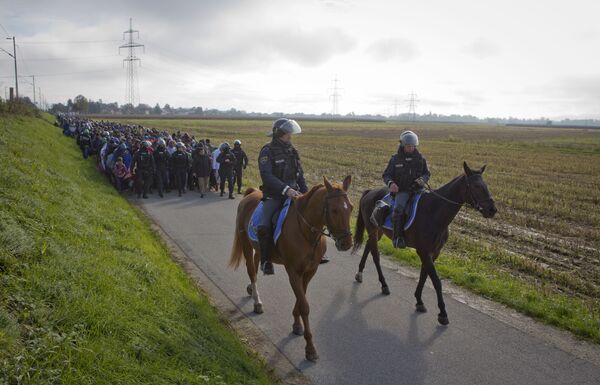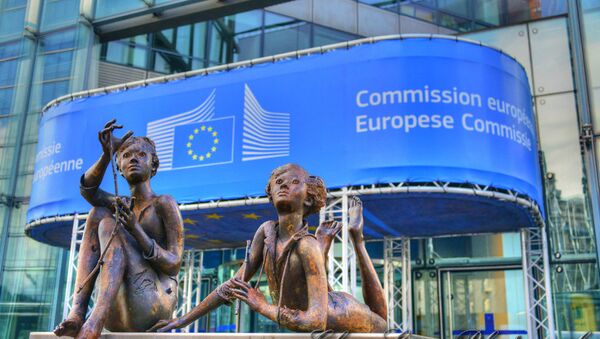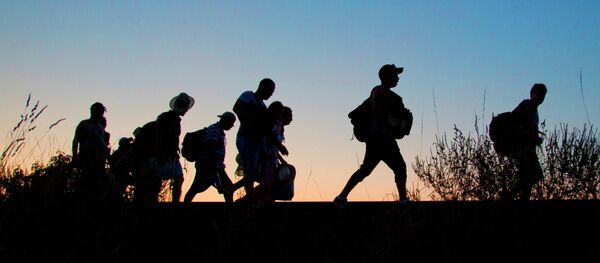The extraordinary meeting has been called by Juncker after the refugee crisis along the Western Balkans route deteriorated into chaos. The vast numbers of asylum seekers fleeing warzones in the Middle East have caused chaos in several European countries.
The leaders of Austria, Bulgaria, Croatia, the former Yugoslav Republic of Macedonia, Germany, Greece, Hungary, Romania, Serbia and Slovenia have all been summoned to Brussels to discuss the worsening situation.
.@JunckerEU calls Leaders’ Meeting in Brussels,25/10 on refugee flows along the Western Balkans route https://t.co/uMj6GBmwEc #refugeecrisis
— Mina Andreeva (@Mina_Andreeva) October 21, 2015
It comes as crowds of refugees and other migrants camp by roads in western Balkan countries in worsening autumn weather, after Hungary sealed off its borders with Serbia and Croatia, causing a chain reaction in other overwhelmed states, Reuters reported.
Slovenia passed legislation on Wednesday to give the army more power to help police guarding the state border — which forms the outer edge of the passport-free Schengen zone — as refugees streamed in from Croatia, on the way to Austria.

EU diplomats said German Chancellor Angela Merkel, under domestic pressure over an influx of hundreds of thousands of asylum seekers, was the driving force behind the latest meeting, just 10 days after the last full EU summit on migration.
Some diplomats voiced concern that Berlin was deepening divisions in the 28-nation bloc by pressing for a permanent mechanism for relocating refugees among member states, which several governments saw as an open-ended commitment and were determined to resist, at least until the influx can be limited.
Volunteers lift small children out of flimsy boat arriving on #Lesvos north shore #refugeecrisis pic.twitter.com/yhzc4PcNat
— Yvette Cooper (@YvetteCooperMP) October 21, 2015
Peter Altmaier, Merkel's chief of staff and coordinator for the refugee crisis, said the aim of the summit was to address the "untenable" situation in which refugees were passing unhindered through the Balkans and north to Germany. Speaking to public broadcaster ZDF, he said:
"It can't be that every country simply allows the refugees through. Therefore the goal is to agree on common steps so that all countries get relief and that the refugees are treated humanely on their path through Europe."
Dividing Line
A dividing line is emerging between governments that see the crisis primarily as a security issue requiring stronger action to control EU borders, stem the flow of migrants, send back those not entitled to asylum and pay other states, if necessary, to keep them at bay, and those that see it above all as a humanitarian integration challenge.
In #Ljubljana tomorrow ahead of 25/10 leaders summit #WesternBalkans route #refugeecrisis convened by @EU_Commission https://t.co/XNZsOTHLaE
— DimitrisAvramopoulos (@Avramopoulos) October 21, 2015
Diplomats said European Council President Donald Tusk reflected the security concerns more strongly, while Juncker saw the EU's humanitarian values at stake. Berlin and Commission officials are also skeptical of the chances of preventing desperate people from reaching Europe.
Last week's EU summit agreed on a range of measures to strengthen external border protection and offer financial incentives to Turkey and other nations to keep refugees on their soil and deter them from heading to Europe.
The new meeting appeared to be an effort by Juncker and Merkel to raise pressure on central and southeast European states to cooperate among themselves in managing the migration flow in a more humane way and end a series of unilateral actions that have raised political tensions.



